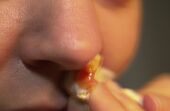|
Nose bleeding, or Epistaxis as it is known in the medical community, is a very common problem across much of North America. Nose bleeds are typically caused by the drying of the nasal membranes, allergies, or a physical injury, and are particularly frequent among children. The nose is very rich in blood vessels and is situated in a position on the face that makes it vulnerable to physical injury.
The incidence of nosebleeds is higher during the colder winter months when upper respiratory infections are more frequent, and the temperature and humidity outside and in the home fluctuate more dramatically. In addition, changes from a bitter cold outside environment to a warm, dry, heated home results in drying and changes in the nose which will make it more susceptible to bleeding. During extremely cold weather, your home loses humidity to the outdoors and may drop as low as 5%. By comparison, typical humidity in the Sahara Desert is about 25%! Generally, one does not want to have a home humidity any lower than 30%. Optimal comfort is considered to be achieved at 40-55% humidity. Nosebleeds also occur in hot dry climates with low humidity, or when there is a change in the seasons. The following list of factors predispose people to nosebleeds:
'Counteract the drying effects of indoor heated air by using a humidifier.' familydoctor.org by the American Academy of Family Physicians 'Humidify the house, especially where your child sleeps.' Medbroadcast.com 'Use a humidifier or vaporizer in your home. This will increase the moisture and help prevent future nosebleeds.' UC Davis School of Medicine and Medical Center 'Use a humidifier/vaporizer.' University of Missouri-Rolla Student Health Services 'Humidify air to prevent dryness.' U.S. National Library of Medicine The following are a number of other suggestions from various health-related organizations and physicians that, when combined with proper home humidification, should reduce the incidence of nose bleeds in your family:
If you think your nose bleeds may be caused by allergies, please visit our sister site for information on the world's highest rated HEPA air cleaner, the Austin Heathmate Series.  CLICK HERE Please Note: Because persistent or recurrent nose bleeds (especially those that are deep in the nasal cavity and those that last for long periods of time) can sometimes be a symptom of a more serious medical problem, you should always consult your physician if you have a history of repeat nose bleeds. Chances are that you just need better air quality (humidification and / or air purification) in your home, but it is better to be safe than sorry. |

 Nosebleeds can occur spontaneously when the nasal membranes dry out, crust, and crack. This is common in dry climates, or during the winter months when the air is dry and warm from household heaters, especially forced air furnaces, and gas, pellet, or wood-burning stoves. A cold or allergy can causes swelling and irritation inside the nose and may also lead to spontaneous bleeding. Of course, in children, picking their noses is also a frequent cause of nose bleeds. In many cases, the drying of nasal membranes and hardening of mucus in the nose creates discomfort that tends to promote this behavior in children.
Nosebleeds can occur spontaneously when the nasal membranes dry out, crust, and crack. This is common in dry climates, or during the winter months when the air is dry and warm from household heaters, especially forced air furnaces, and gas, pellet, or wood-burning stoves. A cold or allergy can causes swelling and irritation inside the nose and may also lead to spontaneous bleeding. Of course, in children, picking their noses is also a frequent cause of nose bleeds. In many cases, the drying of nasal membranes and hardening of mucus in the nose creates discomfort that tends to promote this behavior in children.
 Among the most recommended solutions for recurrent nose bleeding is home humidification using a whole house furnace humidifier. It is generally recommended that you consider a whole house furnace humidifier as opposed to small room humidifiers since the effects of dry air in the home can cause nosebleeds throughout the day, not just while you are sleeping. In addition to moisturizing your nasal passages, a quality whole house furnace humidifier like the Desert Spring requires less maintenance, promotes healthier air quality by making it less hospitable for viruses, bacteria, and many allergens, and prevents damage to your hardwood floors and furniture caused by low humidity.
Among the most recommended solutions for recurrent nose bleeding is home humidification using a whole house furnace humidifier. It is generally recommended that you consider a whole house furnace humidifier as opposed to small room humidifiers since the effects of dry air in the home can cause nosebleeds throughout the day, not just while you are sleeping. In addition to moisturizing your nasal passages, a quality whole house furnace humidifier like the Desert Spring requires less maintenance, promotes healthier air quality by making it less hospitable for viruses, bacteria, and many allergens, and prevents damage to your hardwood floors and furniture caused by low humidity.